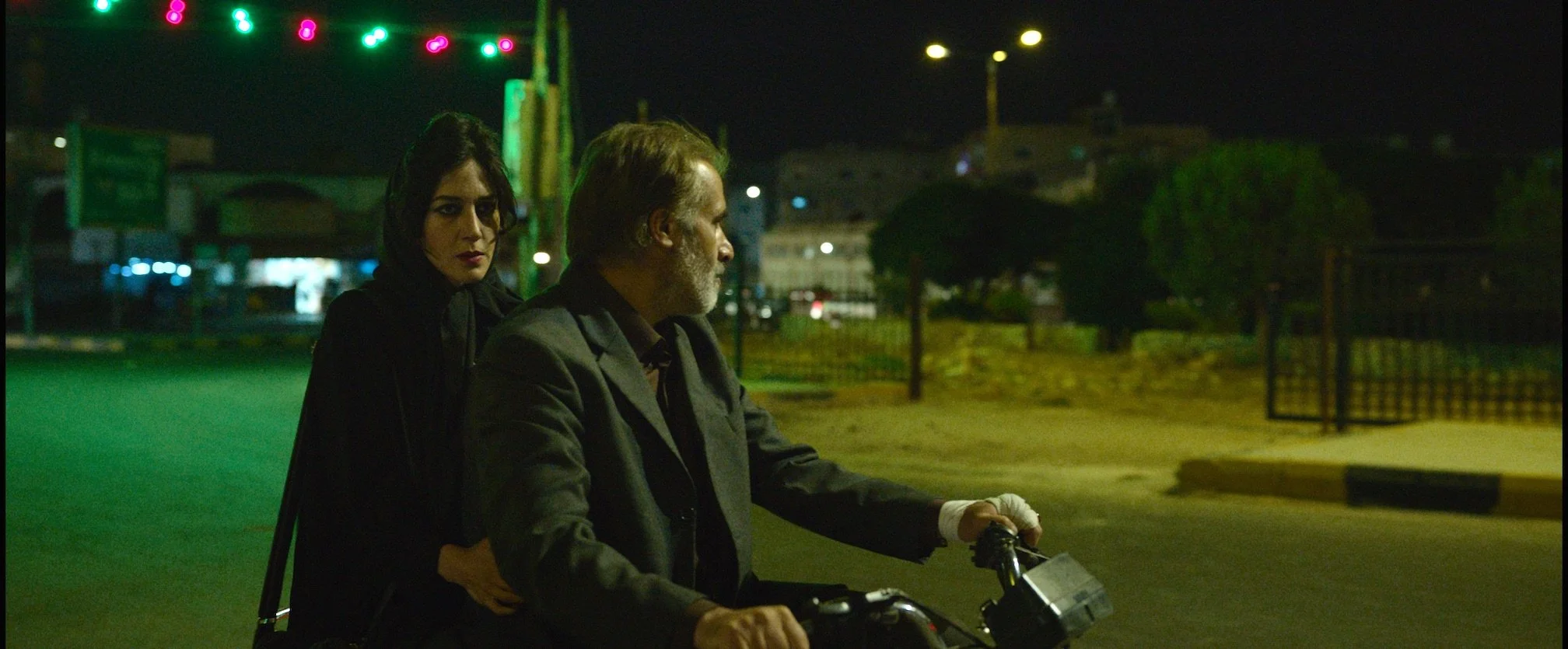Not Just Sport
Actor Zar Amir Ebrahimi steps behind the camera for the first time as director. It’s exactly the film you’d expect from her. And also not.
If you ask actor-director Zar Amir Ebrahimi, yes. Politics do have a place in sport, and organisations like the International Olympic Committee, FIFA and the International Judo Federation, which is a central character in her directorial debut, do have a responsibility to hold nations and states accountable for injustices.
“It does. I don’t necessarily want to talk about politics, but it’s part of everything I do as a woman in cinema. And it comes to sports too,” says Amir Ebrahimi, perched on the edge of a sofa in the HKIFF hotel. She’s wearing maroon leather on an unseasonably humid day in Hong Kong, and she might still be a bit jet-lagged, but she’s also energised by the subject matter of her film, Tatami. “Maybe 20 years ago I could say I was just a filmmaker, or a festival or sports federation didn’t need to react to all these things, but now with age and experience I think it’s so, so necessary for everyone to speak out, and to support those who need it. I think even, I don’t know, the telephone company, should speak out. We have to respect our rights, we have to educate ourselves. Awareness is very important. And if you can do it, if you have a platform that everyone watches, you have this responsibility. As filmmakers, yeah, we’re artists, but we also have responsibilities as citizens and human beings.” British director Jonathan Glazer, currently mired in a war of words stemming from his anti-war comments at the Oscars, comes up in the conversation. He’s got a supporter in Amir Ebrahimi. “That’s our problem today. Too many of us try to ignore the world, and look where we are.”
Amir Ebrahimi actually co-directed with Guy Nattiv on Tatami, on the surface a classic sports drama inspired by a 2019 incident in which Iranian judoka Saeid Mollaei was commanded to intentionally throw a match to avoid meeting an Israeli opponent on the mat. That prompted the IJF to briefly ban Iran from competition – and judo is a huge, huge deal in Iran. It’s also rooted in the 2022 death of Mahsa Amini that followed a brutal beating (allegedly) by Iran’s morality cops for not wearing her hijab “correctly”. Amini’s death sparked the Woman, Life, Freedom movement, something near and dear to Amir Ebrahimi, who lives in France because she got run out of her Tehran hometown on similar bullshit morality charges in 2008. Women’s empowerment is the main thread woven through Noora Niasari’s Shayda, also at HKIFF, also starring Amir Ebrahimi.
One of the reasons Tatami works so well is because Amir Ebrahimi, Nattiv and co-writer Elham Erfani hung their story of political oppression and the abuse of women’s rights on the framework of traditional genre cinema. As is often the case in movies, a musical (Cabaret), a journalism thriller (Holy Spider starring Amir Ebrahimi, which won her an acting prize at Cannes) or a horror flick (Get Out) film can be about much more than singing or haunted houses. Tatami’s familiar sports drama trappings (Martin Scorsese’s Raging Bull was an inspiration) made the central themes much more vivid.
Shot in lush black and white by DOP Todd Martin (in his second feature), in a claustrophobic Academy ratio that mirrors the walls closing in on Iranian judoka Leila Hosseini (played blisteringly by Iranian-Chilean actor Arienne Mandi), Tatami follows Leila over the course of a single day at the Judo World Championships in Tbilisi, Georgia. At day’s start Leila’s feeling confident. She’s got an ace coach in her corner, former judo champ Maryam (Amir Ebrahim), and a supportive husband (Ash Goldeh) on the phone, cheering her on from their living room. Before the competition gets really stiff, she has a chat with an old acquaintance, Israeli judoka Shani Lavi (Lir Katz). When it starts to look like the friendly rivals are headed for a face-off in the final, the Iranian authorities, embodied by shady agent Azizi (Sina Parvaneh) start putting pressure on Leila and Maryam to drop out of the tournament by threatening their families and their safety. Iran will not face a state it doesn’t recognise – and it certainly won’t risk losing to one. At one point, Leila has an anxiety attack thinking of her husband and young son running for their lives, starts hyperventilating and rips off her hijab. It’s the moment in a sports drama where the hero is pushed to their limit, but in Tatami Leila’s action is even more loaded. It becomes an act of resistance.
Tatami was inspired by more than just Mollaei. “I have a long list of athletes, male and female, with the same story. They’re not allowed to compete against Israeli teams in any sport. And whenever it looks like you’re going to face an Israeli opponent you’re asked to fake an injury or find a reason to withdraw. Do you know how many athletes they’ve lost? Iran is strong in judo; it’s very important, and to Israelis too. So they often face each other; it’s natural. But it’s every sport, and it’s the same as cinema. We’re not allowed to work with Israeli people.” In one of the great middle fingers of art, Amir Ebrahimi’s co-director was Israeli filmmaker Nattiv (Golda). Though Amir Ebrahimi and Nattiv started work on Tatami long before the current hostilities between Israel and Hamas erupted, it’s still symbolic of the idea that people can rise above their rulers. The film is “About all these problems. They need war, they need an enemy. We learnt from childhood that we have an enemy: Israel. When you grow up and see that it was an imaginary enemy, and they needed this to just stay in power,” she laments, waving a hand in a “WTF?” gesture, recalling that when she and Nattiv started talking about a collaboration, “We found out that we grew up in the same mood. Now we’re close, and culturally we’re almost from the same family.”
The next time Amir Ebrahimi hits screens as an actor it will most likely be in Eran Riklis’s Reading Lolita in Tehran, co-starring fellow exile Golshifteh Farahani (Extraction). Her next outing as director could take more time. “I’m trying to finance my next feature, but it’s a long runway,” she chuckles. “I was expecting to shoot it this year, but apparently no one else is feeling it, so I’m still working on financing.” That leads to a low-key rant on the state of film economics, how splitting up US$100 million budgets into four or five US$20 million budgets would be a dream come true, and how despite the lip service being paid to diversity, funding doesn’t always get spread around – even for Cannes winners. “It’s very selective. It’s not fair. I only need four or five million to make a movie!” she exclaims, “To ‘remake’ Iran outside Iran is almost epic. It’s not expensive when you [talk about $100 million], but for all those funds and investors it’s expensive. ‘I can give you $1 million, do whatever you want with your movie. You’re not that [important] to us.’” She also agrees that it’s frustrating to see audiences pre-judged by distributors as unresponsive to work – like Squid Game or Oscar-winner Everything Everywhere All at Once – that colours outside the lines. “People aren’t like that. It doesn’t work. But no one wants to take a risk.”
Tatami was a professional risk in more ways than one for Amir Ebrahimi. Initially she was just up for the Maryam role, which turned into jobs as casting director and producer; she had thoughts. On one hand co-directing was risky because anytime you put two directors in a room together, egos will clash. But more than that, “It was literally the first collaboration between an Israeli and Iranian and this is a big, big, big red line for me as an Iranian artist. I knew I was risking a lot.” She hemmed and hawed over collaborating for days, “But then at some point I told myself ‘Holy shit, this is the whole story of this movie.’,” she finishes. “We had this feeling that we were doing something revolutionary. It was just in the air.” — DEK
Where we were
The Mira Hong Kong, TST • Hong Kong International Film Festival
Hong Kong • April 2, 2024





